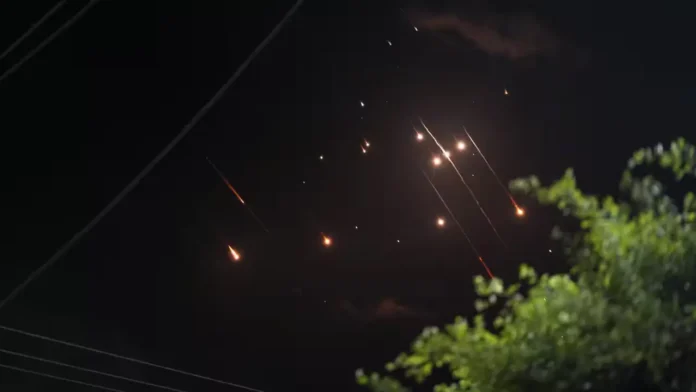In the latest escalation of Middle Eastern tensions, Israel has vowed to respond to a barrage of ballistic missiles launched by Iran. Israeli Prime Minister Benjamin Netanyahu declared that Iran would “pay a heavy price” for the missile attack, which targeted strategic locations across Israel, including military installations. The missile strikes represent a significant development in the longstanding hostility between the two nations, heightening the risk of an all-out regional conflict.
The Attack: A Major Escalation
On October 2, 2024, over 200 ballistic missiles were fired from Iranian territory toward Israel, marking one of the most aggressive missile assaults in recent memory. The attack came in response to what Iran claims were provocations by Israel in the region, including its alleged targeting of Iranian interests in Syria and Lebanon. Iran’s missile strike signals Tehran’s willingness to take direct military action, rather than solely relying on proxy forces such as Hezbollah and other militant groups.
The missiles targeted key military and strategic facilities in central Israel, including airbases and missile defense systems. While Israel’s Iron Dome missile defense system intercepted many of the projectiles, some caused significant damage to infrastructure, leading to civilian casualties and widespread power outages in certain regions. Israel’s military, the IDF (Israeli Defense Forces), has since been placed on high alert, ready to retaliate.
Israel’s Response: “Heavy Retaliation”
Israeli Prime Minister Netanyahu has pledged a severe response to the Iranian missile assault, warning Tehran that it will face “unprecedented consequences.” In a televised address, Netanyahu stated that Israel would not only respond to Iran’s missile attacks but would also target Iran’s military infrastructure and any other elements supporting the missile operations.
Israel is likely to carry out airstrikes on Iranian military facilities, possibly extending into Syria and Lebanon, where Iran has been operating through proxy groups like Hezbollah. Israeli fighter jets have already been seen mobilizing, and military experts anticipate that Israeli retaliation could be swift and comprehensive, targeting key sites of Iran’s military infrastructure, missile development centers, and nuclear facilities. Netanyahu also stated that Hezbollah, an Iran-backed militant group operating in Lebanon, would be drawn into the conflict if they launched attacks from Lebanese soil.
The Regional Impact: A Growing Conflict
The conflict between Israel and Iran has significant implications for the wider region. Iran’s missile strikes have already raised concerns of a wider war, drawing in other regional actors such as Hezbollah, which has warned that it will retaliate if Israel strikes Iranian interests in Lebanon. Hezbollah’s potential involvement could lead to a multi-front war, with Israel facing attacks from both Lebanon and Gaza.
The situation has also brought global powers into the fold. The United States, a key ally of Israel, has reiterated its commitment to Israel’s security, with President Biden condemning the Iranian missile strike and stating that the U.S. stands ready to assist Israel if the conflict escalates further. The U.S. military has already deployed additional missile defense systems in the region to protect Israel and its other allies from further missile strikes.
Conversely, Tehran has issued a stern warning to both Israel and the U.S., stating that any further aggression will result in “stronger attacks” on Israeli and U.S. assets in the region. Iran’s leaders have claimed that Israel’s military actions in Syria, coupled with its recent operations targeting Hezbollah, justified the missile strikes. Tehran has also reiterated that its missile program is defensive in nature, but recent events suggest it is now being used offensively.
Global Economic and Political Ramifications
The conflict has had immediate effects on the global economy, particularly on oil markets. The tension between Iran and Israel—two major players in the Middle East—has already driven up oil prices, with crude oil surging nearly 3% in early trading as concerns grow about supply disruptions. Iran, one of the world’s largest oil producers, holds considerable influence over global energy markets, and any disruption in its output could send shockwaves through the global economy.
Politically, the conflict risks destabilizing the entire Middle East. Countries like Saudi Arabia, which has been in negotiations with Israel over peace agreements, now find themselves navigating a fragile landscape where alliances and interests could shift. Arab nations, many of which have normalized relations with Israel in recent years, now face the difficult task of balancing regional diplomacy with their support for Palestinian and Iranian causes.
Calls for De-escalation
As tensions flare, there have been multiple calls for a ceasefire and diplomatic resolution to the conflict. The United Nations and European Union have urged both sides to step back from the brink of war. However, with both Israel and Iran deeply entrenched in their positions, a de-escalation seems unlikely at this stage. Netanyahu has been clear that Israel will not tolerate missile attacks on its soil, while Iran maintains that its actions are justified retaliation.
Conclusion
The current missile strikes and Israel’s vow to respond mark a critical moment in the ongoing hostilities between Israel and Iran. As Israel prepares for a powerful military retaliation, the situation remains fluid, with the potential for a broader regional conflict that could draw in multiple actors and lead to significant geopolitical and economic consequences.
This latest escalation not only puts the Middle East on edge but also tests the resolve of global powers to manage an increasingly volatile situation in one of the most strategically important regions in the world.



